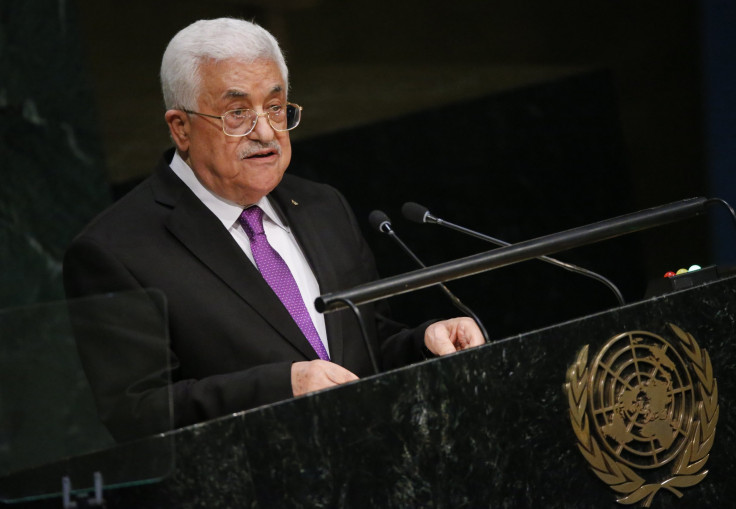Israeli-Palestinian Conflict: President Mahmoud Abbas Calls On Countries To Recognize Palestine As A State, Renounces Agreements With Israel

Palestinian President Mahmoud Abbas blamed Israel Wednesday for a stalled peace process and said Israeli leaders have continued to enflame tensions against international resolutions, even as they continued negotiations with Palestinian officials. As a result, Palestine will no longer be held to its past agreements with Israel and would consider going to the International Criminal Court, Abbas said during an address before the General Assembly at the United Nations.
"Israel has left us with no choice but to insist that we will not remain the only ones committed to those agreements while Israel continuously violates them," said Abbas. "We therefore declare we cannot continue to be bound by these signed agreements with Israel, and Israel must assume fully all its responsibilities as an occupying power because the status quo cannot continue."
He called for states to recognize Palestinian independence, while affirming that Palestine is currently an occupied state. "If you recognize the two-state solution, why won't you recognize the other state?" Abbas asked. "Today I call upon those countries that have not yet recognized the state of Palestine to do so."
The United Nations General Assembly is generally considered a welcoming audience for Abbas, as Palestine was voted a nonmember observer state of the U.N. in 2012. The Palestinian flag was raised at the U.N. for the first time Wednesday, an act praised by Abbas.
"It is our hope those who have not done so will do so as soon as possible," he said, noting that the Vatican, and several other states, have recognized Palestinian statehood in recent months. He also said the Palestinian flag would soon hang in Jerusalem, the contested capital claimed by both Israel and Palestinian officials.
"I extend a sincere call to the people of Israel for peace based on justice, security and stability for all. I also call on the Security Council and the General Assembly to uphold their responsibilities before it is too late. I do sincerely hope they could fulfill their responsibilities before it is too late," he said.
NEW: Palestinian gov't no longer bound by agreements with Israel, Pres. Mahmoud Abbas says http://t.co/ZhPsG3grl7 http://t.co/H2zP7THNSm
— CBSN (@CBSNLive) September 30, 2015
Palestinian leader Mahmoud Abbas declares he is no longer bound by agreements signed with Israel - @AP http://t.co/rQGSI3MP9J
— Breaking News (@BreakingNews) September 30, 2015
Abbas has grown increasingly frustrated over a stalled peace process in recent years, as the 80-year-old leader has seen limited progress toward the establishment of an independent Palestinian state during his leadership. Abbas has complained about the expansion of Israeli settlements, as the Israeli military has continued to rule over large parts of the West Bank.
Abbas recently announced his resignation as leader of the Palestine Liberation Organization -- or PLO, the most significant international representative body for Palestinians -- but remained the president of the Palestinian Authority, the governing body in the West Bank. He vowed “a bombshell” at the United Nations General Assembly meeting.
Earlier this month, a senior Palestinian official told Ma’an News Agency that Abbas was expected to announce a nullification of the Oslo Accords between Israel and the Palestinians. The agreement was considered a landmark moment when it was reached in 1993, as it marked the first time Israeli and PLO officials formally recognized each other and stipulated the gradual withdrawal of Israeli forces from the West Bank.
Abbas has come under increasing internal pressure as his government has been viewed as corrupt and ineffective. A recent poll of Palestinian public opinion found that, as a growing number of Palestinians have become pessimistic about their future, 65 percent of Palestinians would like to see Abbas resign.
The West Bank has experienced a slumping economy as it continues to face a deficit at 18 percent of its gross domestic product. Palestinian officials have said Israel's policies in the region make it difficult to build a successful economy due to restrictions on movement. In Gaza, under the Palestinian faction Hamas controlled, the economy has been staved off by an Israeli blockade, which has heavily restricted imports and exports into the Gaza Strip since 2007. Israel has a GDP of some $291 billion, whereas the Palestinian territories have one of just $11.3 billion.
© Copyright IBTimes 2025. All rights reserved.






















